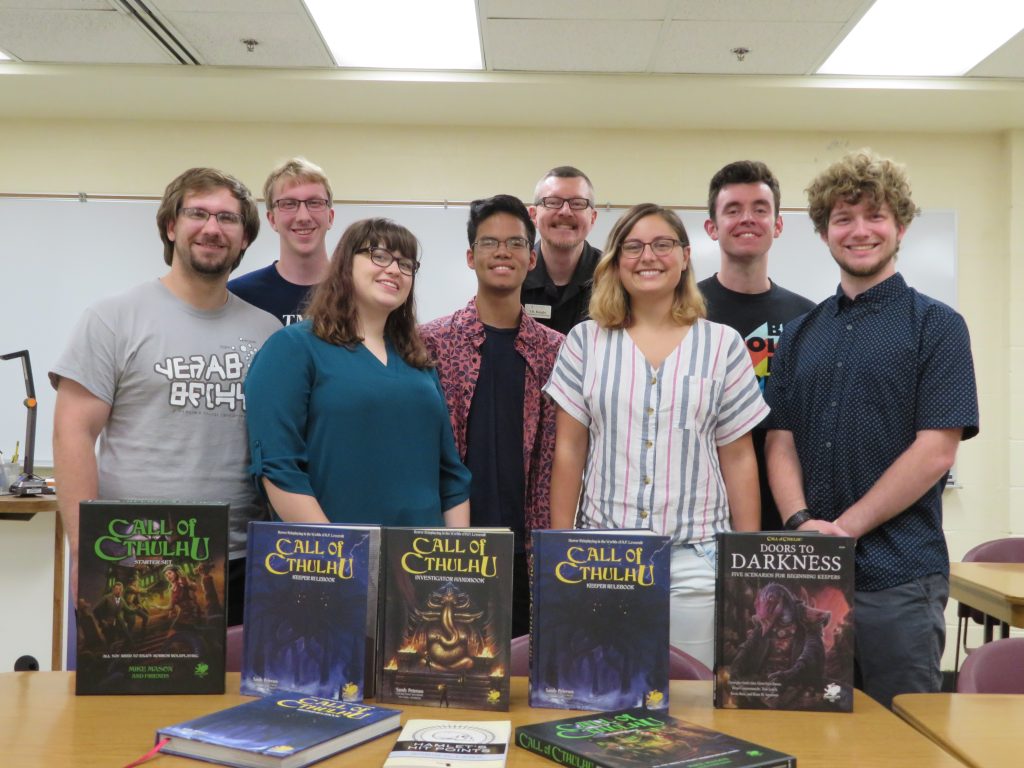This week, we held the first class session for PWR 370 Tabletop Game Writing Lab at Taylor University. We discussed the class schedule (quite an accelerated process for research, writing, editing, layout, and publishing) and began our discussion of possible themes and focus for our RPG adventure. We plan to build on existing Indiana legends and supernatural stories. The students are currently reading Hamlet’s Hit Points by Robin D. Laws to better understand story beats and the Sharing Nightmares section of Call of Cthulhu – Doors to Darkness by Chaosium which “Gives tips for game mastering and playing Call of Cthulhu”.

For this first course, Chaosium has agreed to collaborate with my class to publish an adventure module for the Call of Cthulhu RPG on their Miskatonic Repository community content resource on DriveThruRPG. Call of Cthulhu creative director Mike Mason and Call of Cthulhu associate line editor Lynne Hardy will be video conferencing with the students in the coming weeks to discuss story development and the writing and editing process.
COURSE DESCRIPTION
Hands-on design, development, and writing from concept to finished product of a tabletop game sourcebook. Students enrolled will work with the professor and associated tabletop game publisher to learn the assigned game system, research supplemental materials, outline the manuscript, then draft, write, edit, and proofread the sourcebook in preparation for publication.
COURSE GOALS
At the end of this course, students will have experienced the unique elements and skills required for writing, editing, layout, and self-publishing in the tabletop game industry.
COURSE OBJECTIVES
- To experience the roles of writer, editor, and layout in the game industry.
- To learn from game industry professionals.
- To give students practical experience that will help them garner the attention of game publishers.
COURSE ELEMENTS
- Adventure Module Outline – The class as a group will develop the outline for the Adventure Module to be written, edited, and published during the semester.
- Individual Section Outline – Each student will be assigned a section of the Adventure Module. That section must then be outlined by the student.
- Individual Section First, Second, and Final Draft – Each student will be assigned a section of the Adventure Module to be written (2000 to 3000 words). The assigned section must be in constant development in class, and will be evaluated over three drafts, edited by peers.
- Individual Section First and Second Draft Edits – Students will swap their assigned section drafts of the Adventure Module to be edited by a peer. The edits will bring the swapped sections into the required word count and to fit into the perspective and style of the Adventure Module.
- Final Element – Each student will be assigned a Final Element for the published document, possibly in partnership with another student. These Final Elements include:
- Art Direction – Designing Front Cover, Back Cover, and Credits Page. Choosing interior art.
- Editor 1 – Compiling the sections into a single book and confirming Style Guide elements.
- Editor 2 – Confirming page number references. Creating Table of Contents and Index.
- Layout – Utilizing the providing Chaosium template, laying out the book to be ready for publication.
- Proofreader – Proofreading the entire document to catch items missed by Editors or Layout.
- Completed Book to be published at Chaosium’s Miskatonic Repository.
I will keep you updated as the semester progresses!



Would love if this was an online course
I have heard that from quite a few people. I have approached our online school to determine interest and feasibility.